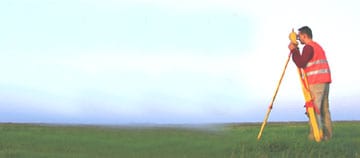What You Need to Know About Boundary Surveys
CMR
Boundary surveys in Massachusetts are governed by something called Commonwealth of Massachusetts Regulations, or CMR for short. There are not laws passed by the Legislature, these regulations have the same effect and legal authority as a bill passed in the House and Senate and signed by the Governor. The section that governs boundary surveys is 250 CMR Section 6.00. A copy of these regulations is posted on the web site of the Massachusetts Division of Professional Licensure and has been in effect since 1985.
In the course of performing a boundary survey, the professional surveyor will not only trace back the chain of title for the subject property, but also for the properties that abut or share a common boundary with locus.
The surveyor will then use his experience and training to determine where to place the property lines of record on the ground. New monuments may be set or referenced.
A plan suitable for recording at the Registry of Deeds will then be prepared that shows the results of the boundary survey. Most of the land parcels in Massachusetts were created on a piecemeal basis over a period of 350 years. Some have record plans and as it is in most aspects of life, all land records are not created equal in accuracy and quality. Only a boundary survey can make that determination. Anyone who requests a boundary survey should obtain a written estimate of the cost, time frame and owner’s requirements.
ALTA
Shorthand for American Land Title Association/American Congress on Surveying and Mapping. This type of survey is usually reserved for commercial properties such as industrial properties, stores and apartment buildings. ALTA/NSPS surveys are unique in that there is a predetermined list of items that the client can request to be included or excluded from the survey.

Massachusetts
In Massachusetts, land transactions are done on a caveat emptor basis (let the buyer beware). As a result, most commercial lenders require that anyone who borrows money on a commercial property purchase title insurance to protect the lender in the event a title or ownership problem should be discovered.
Over the years, the title insurance industry and the surveying community have agreed upon what should be disclosed or discovered by an ALTA/NSPS surveys. Should an owner purchase an owner’s title insurance policy, an ALTA/NSPS surveys would be required.
If such a survey is not provided, the insurance policy usually contains the disclaimer that all items that may be discovered in an ALTA/NSPS surveys are excluded from coverage.
As sellers, they may not be aware of possible defects in title. an ALTA/NSPS surveys is a good way to protect a buyer’s and lender’s title. As the requirements and specifications of this type of survey are always changing, we never recommend that an old survey be used.
Land Court
Land Court Surveys are a unique type of survey that should only be performed in limited circumstances. Massachusetts has a division of the Superior Court System called the Massachusetts Land Court. This court rules only on issues that affect real property (land), title issues and zoning issues.
The court also has its own list of requirements for what it wants to be shown on survey plans, the way the survey is to be performed, the degree of accuracy, and the type of media the plan is to be drawn on for presentation to the Court. After the Land Court Survey has been prepared the plan is submitted to the court for approval.
Land Court Survey
Often times, the surveyor who prepared the Land Court Survey must meet several times with the court’s surveyors to revise, change, and make additions to the surveys. This can be a lengthy process and the Land Court always has a backlog of cases. After a trial, the Land Court will issue a court order that defines the property lines and the Court Survey department will redraft the submitted plan and issue a Decree Plan that conforms to the Land Court Order.
From that point on, the Commonwealth of Massachusetts guarantees the title to the property, except in certain instances.
Once the title to the property has been registered with the Land Court, the property is protected against any claim of adverse possession.
One of the drawbacks to having a Land Court Survey is that the Land Court does not guarantee the physical location of the property. If the monuments that define the location of the property are destroyed, the owner must pay to have a supplemental Land Court Survey performed to relocate the property lines. The other drawback is that you must deal with the Commonwealth bureaucracy. Unless there is a problem that can only be resolved by a court decree, we generally do not advise a client to have a Land Court Survey performed.